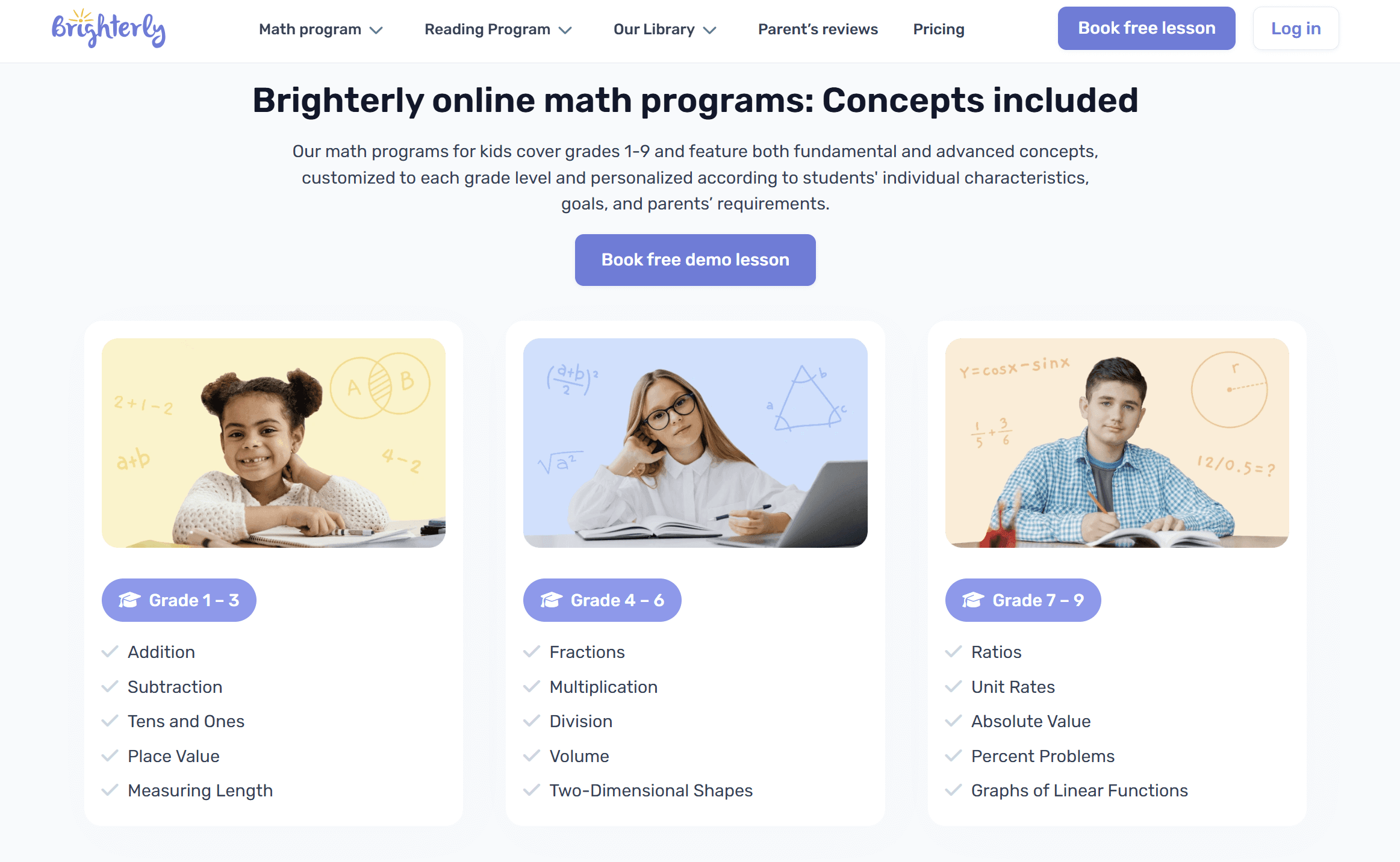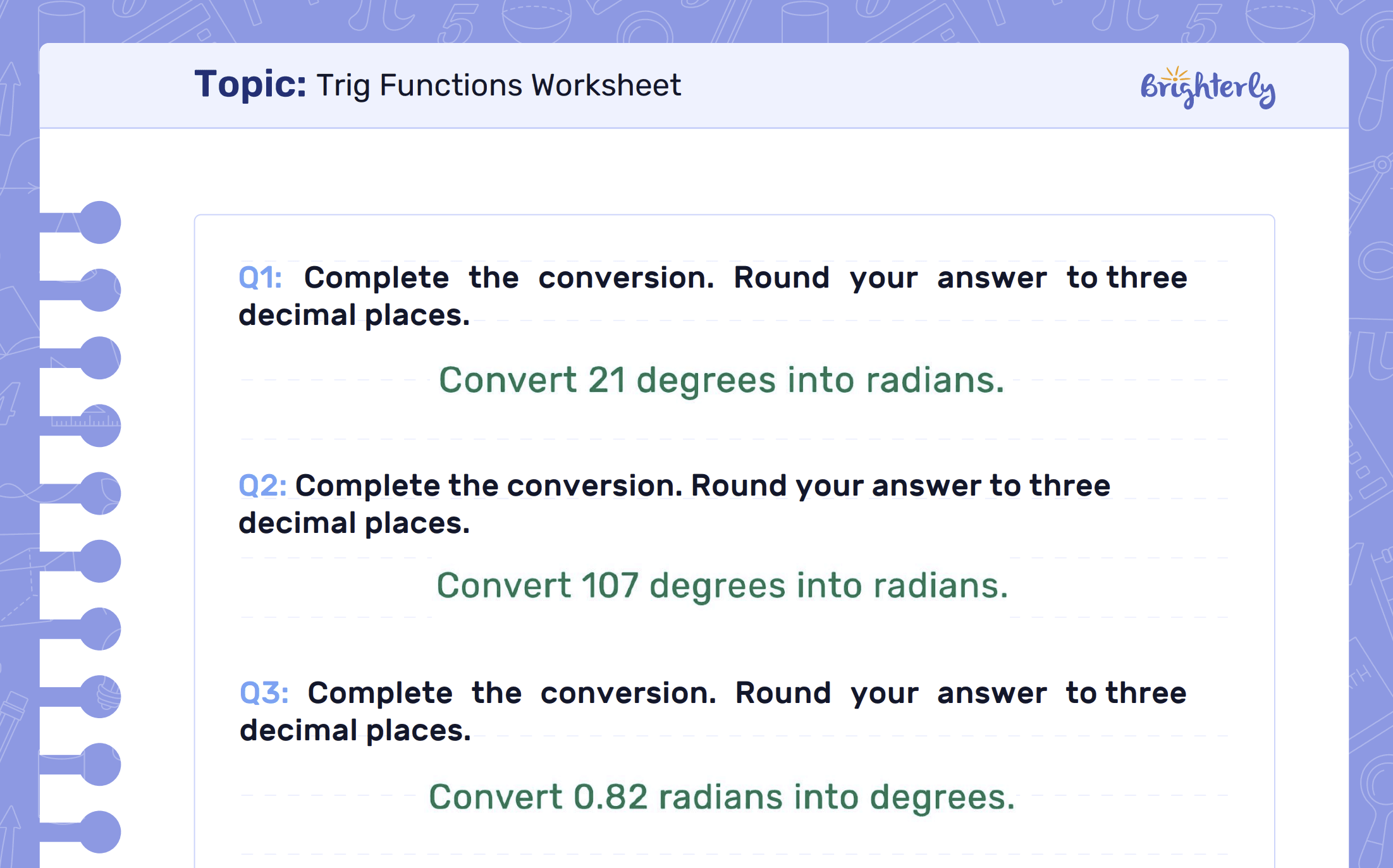What Do 10th Graders Learn in Math?
reviewed by Jessica Kaminski
Updated on December 30, 2025
If your child is approaching the sophomore year of high school, you’re probably wondering, “What do 10th graders learn in math?” After teaching math for 10 years, I’m here to answer your question and help you prepare your child and yourself effectively for math success.
Key points
- In their sophomore year, high-school students study Algebra II, Geometry, and Precalculus, building on the tenth grade knowledge and preparing for junior and senior year.
- As a parent, you can help your child by laying a strong foundation, establishing positive learning routines, reviewing concepts and mistakes, and enhancing self-esteem.
- To prepare your child for the 10th grade math, you can benefit from 1:1, personalized tutoring throughout elementary and middle school and the freshman year of high school, like Brighterly.
What is 10th grade math?
10th grade math, also referred to as sophomore math, is a high-school level course that builds on previous knowledge and prepares students for more complex topics in 11th and 12th grade. It strengthens problem-solving, critical thinking, and logical reasoning skills to ensure students are ready for upper-level courses like Calculus.
What do you learn in 10th grade math?
In the 10 grade math, you learn advanced mathematics courses, such as Algebra II, Geometry, and Precalculus. Students work on more complex algebraic concepts, geometry applications, and early pre-calculus sets of skills. Topics cover linear and quadratic equations, functions and graphs, coordinate geometry, basic trigonometry, and data analysis.
Core tenth grade math skills
- Solving and graphing linear and quadratic equations
- Factoring and using the quadratic formula
- Analyzing functions and graphs
- Working with systems of equations
- Using algebraic and graphic methods to solve systems of equations
- Applying coordinate geometry, including distance, midpoint, slope, and circles
- Using basic trigonometry, such as sine, cosine, and tangent, in right triangles
- Interpreting data and statistics
- Applying scatter plots, correlation, and basic probability
How can parents help with the 10th grade high school math?
- Strengthen foundational math skills prior to 10th grade
- Create a consistent learning routine
- Offer a positive studying space
- Encourage showing all work, not just answers
- Track progress by topic
- Connect math to real life
- Use technology
- Review mistakes
- Build confidence
Strengthen foundational math skills prior to 10th grade
The most important strategy to set up your child for success with sophomore math problems is to ensure they’re in command of all concepts covered up to 10th grade. One-on-one tutoring helps solidify knowledge and prepare children for high school.
The Brighterly math and reading platform offers personalized, 1:1 learning for grades 1-9, which covers fundamental and advanced math concepts. The math program is fully aligned with the US state standards and is STEM-focused. Meanwhile, the learning plan is adapted to the individual needs of every student after a careful assessment of their knowledge, strengths, and weaknesses.
Brighterly math tutors are professional teachers with subject-related degrees and experience in the field. They’re trained to customize the teaching method to students with diverse requirements to prepare them for the 10th grade math. Additionally, they have excellent personal skills to support children and enhance their confidence. Trustpilot reviews consistently praise Brighterly teachers for their professionalism, patience, and friendliness.

Moreover, Brighterly offers free math worksheets for your child to practice skills by grade level and topic.
Finally, your child can take the free math tests to ensure they have all the skills needed to start tenth grade on the right footing.
Create a consistent learning and homework routine
Build positive habits by encouraging your child to revise topics as soon as they’re covered at school and study at regular times each day.
Offer a positive studying space
Set up a quiet, distraction-free, creative space for your kid within your home where they can study without disturbances from siblings or pets.
Encourage showing all work, not just answers
Teach the child to put their thinking and logical conclusions on paper. 10th grade math teachers emphasize reasoning and step-by-step problem-solving.
Track progress by topic, not just grades
Reward your child when they master a concept. Keep track of areas that are causing trouble and come back to them regularly.
Connect math to real life
Teach this abstract subject by demonstrating the presence of math in nature. Show how math concepts relate to STEM fields to make them more relatable and inspire your child to consider a STEM career.
Use technology
Use the best math apps to explain more challenging concepts and practice problem-solving. Sophomores are crazy about tech.
Review mistakes
Work together through problems that your child solved incorrectly and explain the reasoning. Review them in a few days to solidify the knowledge.

Build confidence
Importantly, specific knowledge and self-esteem go hand in hand when it comes to success in math. Help your child boost their confidence through solid skills.
What are the topics in mathematics in grade 10?
- Linear equations and inequalities
- Quadratic equations and functions
- Systems of equations and inequalities
- Linear, quadratic, and exponential functions and graphing
- Slope, distance, midpoint, and circles in coordinate geometry
- Sine, cosine, and tangent in basic trigonometry
- Polynomials and factoring
- Radical and rational expressions
- Data analysis and probability
What math is taught in 10th grade?
10th grade algebra
Algebra math for 10th graders expands on Algebra I by focusing on more complex equations, functions, and symbolic reasoning. Sophomores learn how to analyze mathematical relationships and model real-world problems in preparation for pre-calculus.

These are just a few topics covered in this grade:
- Linear equations and inequalities. 10th graders solve linear equations and inequalities in multiple steps and graph their solutions on a number line or coordinate plane. They see how these math skills apply to real-life scenarios.
- Systems of equations. In 10th grade math problems, students use graphing, substitution, and elimination to identify where multiple relationships intersect.
- Quadratic equations and functions. Solving 10th grade math equations requires working with quadratic expressions, factoring, completing the square, and using the quadratic formula. They also need an analysis of the parabola.
- Polynomials and factoring. High school learners add and subtract polynomials as well as multiply and factor them. This includes special products and factoring techniques to simplify expressions and solve problems.
- Radicals and rational expressions. Students get introduced to simplifying radical expressions, solving equations with square roots, and working with rational expressions. They study domain restrictions too.
- Exponential functions. 10th grade math questions in algebra explore exponential growth and decay. Students learn how exponential functions are used to model real-world situations, such as population growth and compound interest.
- Logarithms. In 10th grade, students learn about logarithms as the inverse of exponential functions. This helps students solve exponential equations and comprehend logarithmic scales.
10th grade geometry
Shapes, space, and reasoning is geometry 10th grade math. In this grade, students learn to analyze geometric figures, prove relationships, and apply formulas to real-world problems that involve distance, angles, and area. They also cover:
- Coordinate geometry. Sophomore math students study how to use the coordinate plane to calculate slope, distance, and midpoint. They explore how to analyze geometric figures through algebraic methods.
- Angles, lines, and proofs. 10th grade geometry covers angle relationships, parallel and perpendicular lines, and introductory-level geometrical proofs. In this way, it helps develop logical reasoning skills in teens.
- Triangles and congruence. Students study the properties of triangles, congruence criteria, and geometric relationships. This allows them to understand how shapes are formed and how they are compared.
- Similarity and transformations. Math problems for 10th graders dive into similarity, scale factors, and transformations, such as translations, reflections, rotations, and dilations.
- Circles. This unit introduces the properties of circles. This includes radius, diameter, circumference, area, arcs, and angles formed by chords and tangents.
- Area and volume. Sophomore students learn how to calculate the area of two-dimensional figures and the volume of three-dimensional solids. In this regard, they study the relevant formulas.
Precalculus
What you learn in 10th grade math continues with Precalculus. This course introduces advanced functions to prepare students for Calculus in 11th and 12th grade. It focuses on deeper analysis and understanding of functions, relationships, and mathematical modeling, bringing together algebra and higher-level math.

The math area includes such topics:
- Advanced functions. In 10th grade, students begin working with polynomial, rational, exponential, and logarithmic functions. They analyze their behavior, the graphs they form, and how they’re applied in real life.
- Trigonometric functions. In 10th grade, trigonometric functions go beyond basic ratios by incorporating sine, cosine, and tangent in the form of functions. This covers graphs, identities, and measuring angles in degrees and radians.
- Function transformations. Math 10th grade classes explore how the shifting, stretching, reflecting, and scaling of graphs impact algebraic functions. This helps sophomores understand the relationship between changes in equations and their graphs.
- Sequences and series. In Precalculus, teens learn about arithmetic and geometric sequences. They study the formulas needed to explain patterns, growth, and real-world financial scenarios.
- Limits and rates of change. The Precalculus course briefly talks about limits and average rates of change. This helps students start building intuition for calculus concepts.
10th grade math curriculum levels
Remedial level
The remedial level of 10th grade math is designed for students who need reinforcement of foundational math skills and concepts. It’s meant for sophomores who are behind grade level so that they can catch up with their peers and move forward with more complex topics in their junior and senior years.
What math do 10th graders take at the remedial level?
10th graders at the remedial level focus on the revision of basic math themes before diving into more complex topics. The instruction moves at a slower pace with review of Prealgebra and Algebra I topics and gradual introduction of Algebra II, Geometry, and Precalculus.
The focus at this level is on closing learning gaps, helping students reach grade-level knowledge, and building confidence. Some students at the remedial level might benefit from math intervention programs.
Regular level
The regular level of the 10th grade math follows the standard math curriculum for the sophomore year taught at US high schools. This covers all the Algebra, Geometry, and Precalculus topics that I’ve already listed above.
The standard level is for students who are at grade level in their math skills and need to continue building knowledge steadily and regularly to be prepared for next year. While these students are up to speed, they don’t have a special interest or talent in mathematics.
Advanced level
The advanced level of math is designed for students who demonstrate exceptional math skills and who are able to learn math concepts quickly and easily.

What math do you take in 10th grade at the advanced level?
10th grade advanced math usually deals with more complex topics and touches on Honors Algebra II and Precalculus. Topics are explored in greater depth than at the regular level, while the coursework moves at a faster pace. This level prepares students for Calculus, AP math courses, and STEM-focused pathways.
What does 10th grade math look like in practice?
In practice, studying 10th grade math involves daily math classes, regular homework assignments, ongoing quizzes, unit tests, and cumulative exams. Math classes move at a steady pace, and new topics are introduced every few weeks. Students usually learn Algebra II, then Geometry, and finally Precalculus rather than mixing all concepts together.
Sophomore math students are expected to show work, explain reasoning, and apply concepts independently. They should demonstrate understanding of the topics rather than just memorize math facts and formulas.
To succeed in 10th grade math topics, you need to set up a learning routine, practice daily, and review regularly. It’s important to solve a number of problems on each topic to build routines and get used to dealing with different types of math situations.
Conclusion: Supporting your child in the 10th grade math
Math for 10th graders covers Algebra II, Geometry, and Precalculus. Some topics include linear and quadratic equations, coordinate geometry, and trigonometric functions. You, as a parent, can support your child by helping them build a studying routine, review regularly, and learn from mistakes. But the biggest help you can offer is to make sure your kid has a solid basis in foundational math concepts prior to entering 10th grade. And one of the most efficient ways to do this is through individualized private tutoring.
With Brighterly math tutoring for grades 1-9, your child benefits from:
✅Setting up a solid math foundation in basic and advanced topics before sophomore year
✅Professional math teachers with excellent knowledge and exceptional interpersonal skills
✅Free educational resources to practice concepts
Ready to prepare your little learner for math excellence in 10th grade and beyond? Book free lesson now to put your child on the path to academic success.

















